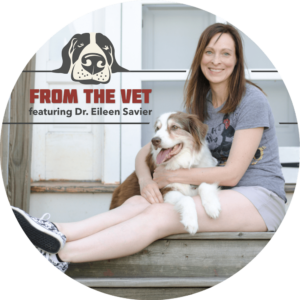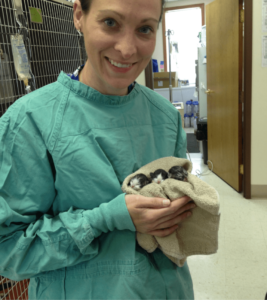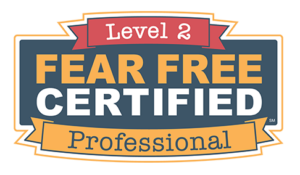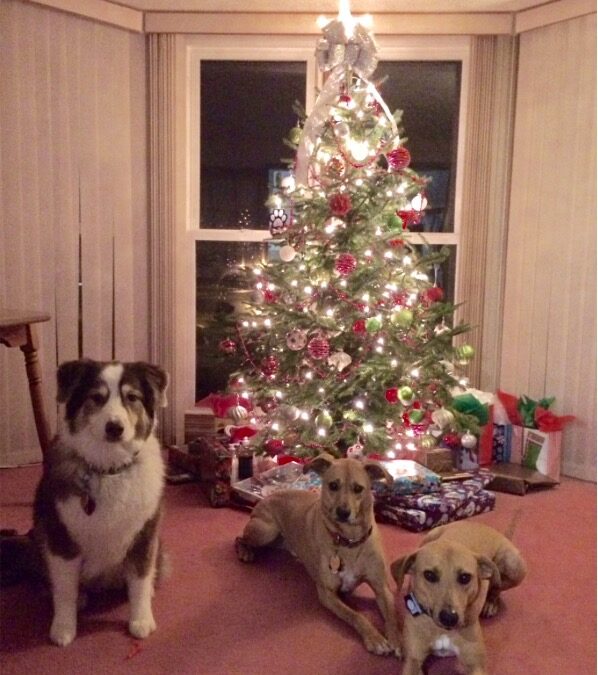[vc_row][vc_column][trx_section box=”yes”][trx_title align=”center” color=”#d9ae4c” weight=”700″]
Holiday Gifts
[/trx_title][trx_title align=”center” color=”#d9ae4c” weight=”700″]
Our Gift Giving Guide for Pups
[/trx_title][trx_title type=”4″ align=”center” color=”#434544″ weight=”700″ bottom=”mini”]by Dr. Eileen Savier CVA, CVCH[/trx_title][vc_column_text]

We all love giving presents to our pets this time of year! I love watching my dogs tear into wrapping paper and run around with new toys… I think it is more satisfying than watching my daughter open gifts (shhhh! Please don’t tell her). I want to share a few things to think about when buying for your pets this year…
Food treats, yum. When buying snacks and eatable items, try to stick with things you and your pet are familiar with. Being adventurous and trying new things is probably not the best idea when the only places open for care on holidays is the emergency room! This becomes additionally important if your pet has underlying medical conditions that make them more prone to developing gastrointestinal disease when eating new things (pancreatitis and inflammatory intestinal diseases). The same amount of caution should be used when accepting and feeding homemade treats too. Please ensure that spices that spices that are toxic for dogs were not used! It can be a costly and painful – albeit innocent – mistake.
Toys, toys, toys! Be sure the toys are buying are age, breed, and PET specific! Let’s break this down a little more.
- Age specific toys. If Santa brought you a new puppy, then stick to puppy toys specifically. Some toys designed for adult dogs maybe too hard for puppy teeth. It is also important to inspect puppy toys regularly for damage. All damaged toys should be thrown out to prevent ingestion of stuffing and strings.
- Breed specific toys. Do not buy tea cup poodle sized toys for your pit bull. This should be obvious but this goes for things like chewable toys too. Small toys can easily be swallowed by larger dogs and result in an intestinal obstruction.
- Pet specific toys. This really boils down to how well you know your own dog. If you dog has ingested toys in the past leading to illness, then that should factor in to which types of toys you consider buying. If your pet rips and shreds toys stay away from easily destructible toys.
I hope you all have a safe and enjoyable holiday season, I cannot wait to see pictures of your pet with their new gifts!
[/vc_column_text][/trx_section][/vc_column][/vc_row][vc_row css=”.vc_custom_1533135180690{margin-top: 40px !important;}”][vc_column css=”.vc_custom_1533134942241{background-color: #d9ae4c !important;}”][trx_title type=”2″ align=”left” color=”#f6f2e4″ left=”20″ right=”20″]About Dr. Eileen Savier[/trx_title][vc_column_text css=”.vc_custom_1533135315368{padding-right: 20px !important;padding-bottom: 30px !important;padding-left: 20px !important;}”] Barks & Recreation is proud to feature Dr. Eileen Savier CVA, CVCH as our Veterinary Blogger in our “From the Vet” Series. Currently part of the team of doctors at Keystone Veterinary Clinic, Dr. Savier is a 2012 Graduate of the Ross University School of Veterinary Medicine, She completed her clinical experience at The Ohio State University and after veterinary school she pursued further education and certification in Veterinary Acupuncture, Chinese Herbal Medicine, and Fear Free veterinary visits. Dr. Savier has a special interest in integrative medicine, animal behavior, and internal medicine and is committed to improving animal health care by integrating Eastern and Western philosophies. She enjoys working with fearful & aggressive dogs and cats and she has had additional training in low stress handling techniques and encourages positive reinforcement during exams and procedures. Her clinical interests include pain management, animal behavior, geriatric patient care, and internal medicine. Dr. Savier is a member of the following associations:
Barks & Recreation is proud to feature Dr. Eileen Savier CVA, CVCH as our Veterinary Blogger in our “From the Vet” Series. Currently part of the team of doctors at Keystone Veterinary Clinic, Dr. Savier is a 2012 Graduate of the Ross University School of Veterinary Medicine, She completed her clinical experience at The Ohio State University and after veterinary school she pursued further education and certification in Veterinary Acupuncture, Chinese Herbal Medicine, and Fear Free veterinary visits. Dr. Savier has a special interest in integrative medicine, animal behavior, and internal medicine and is committed to improving animal health care by integrating Eastern and Western philosophies. She enjoys working with fearful & aggressive dogs and cats and she has had additional training in low stress handling techniques and encourages positive reinforcement during exams and procedures. Her clinical interests include pain management, animal behavior, geriatric patient care, and internal medicine. Dr. Savier is a member of the following associations:
- American Veterinary Medical Association (AVMA)
- International Veterinary Academy of Pain Management (IVAPM)
- American Association of Feline Practitioners (AAFP)
- American Veterinary Society of Animal Behavior (AVSAB)
- American Association of Traditional Chinese Veterinary Medicine (AATCVM)
- Ohio Veterinary Medical Association (OVMA)
Dr. Savier shares her home with two (soon to be three) dogs, two cats, and a toddler. She lovingly refers to her two dogs as Coconut Retrievers as they were rescue dogs she brought home from the island of St. Kitts. In her free time she enjoys spending time with her family, going to the beach, and planning her next Disney vacation.
Join us every month for Dr. Savier’s “From the Vet” series to get more information related to the health and welfare of your furry family members![/vc_column_text][/vc_column][/vc_row]



